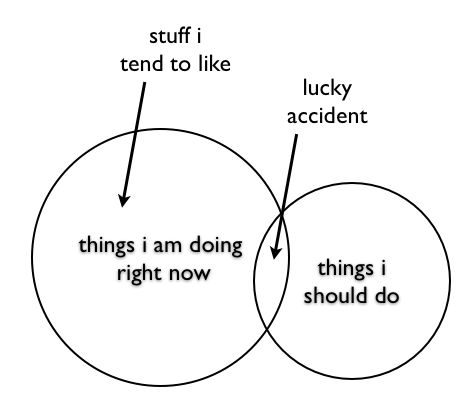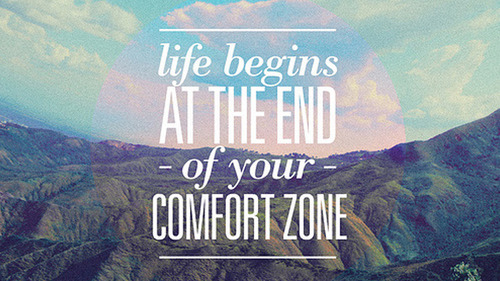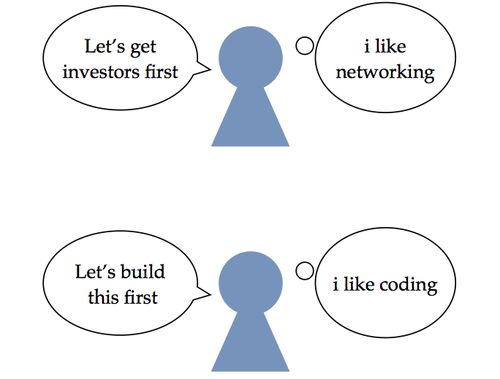The Founder’s Lie About Comfort Zones
Nov 26, 2012 · 7 min read · 23,223 views

There is a lot of talk going on about the endurance and struggle that startup founders go through. How long the hours are, we all pull through and how we are constantly out of our comfort zone.

We run startups – we are constantly at the border of our comfort zone. Aren’t we?
No we are not. We are just better in lying - especially to ourselves
I see founders…
I see founders, super busy, super buzzed, some even close to burnout, working to their death…
- The visionary founder rushing to one international conference to the next
- The visual designer reworking the startpage ten minutes before launch
- The coder that has no time to do customer interviews because the s3 integration took longer than expected.
- The biz guy who constantly meeting potential strategic partners for long term bizdev or fundraising or “sparring”.
- The guy who worked in a marketing agency who hustles like crazy to get this media cooperation/competition to scale the business, knowing exactly what kind of “persona” he targets, but has never met more than 5 of them.
- The dev guy taking extra meetings with this aws scaling expert
- The geeks who start a fashion startup and work their asses off on their tech space problems than on their fashion space problems.
All of them super busy… …doing what they like most.
All of them worried about stuff they are anyway best in.
I am super busy and I do uncomfortable things…
Speaking on a stage in front of a lot of people, pitching that big name VCs, getting ripped apart by feedback, approaching grumpy journalists at conferences, all-nighters coding to get the mvp ready, fly-overs to different continents last minute organized. That’s keeping us super busy but actually we love that shit.
Worrying abut the tech stack, the investment strategy and long term problems - Awesome. Talking about stuff we love disguised as getting feedback - Genius!
We even believe that we are doing the important stuff, the hard stuff, the stuff outside of our comfort zone.
Everything looks like a hammer
I chose to do [stuff], because I like doing [stuff]. And in general if you are in the position to do what you love on a daily basis you are fortunate and should appreciate that.
The problem is that very often we change our strategy based on what we like to do. Sometimes we are aware of it, sometimes not.

We are the best liars
Founders are naturally aligned to be super passionate and highly convincing. A first-time founder will either convince you that his product is awesome or he will talk you to death until you declare defeat and accept its awesomeness.
Founders are the best in shaping reality, focusing only on aspects, talking about future stuff like it has already happend. Founders are the best in lying. We are so good in lying we even lie to ourselves. Aware or not.
We are often unaware of it because our reality is subjective and skewed.
I - as a coder - strongly believe that integrating A/B testing on our landing page is the best thing to do for the company - right now - i know it with all my heart! This is valuable work! And i can explain you why!
We benchmark against things we subjectively value highly – and are not aware that our benchmark is based on our subject perception of reality.
Also nature works against us…
If we pick stuff we are good in - we have little moments of success - little positive feedback loops - telling us we are “doing a thing right” - which we confuse with “doing the right thing”.

How to detect
Simple example: If you are a tech-centric founder-team and you are trying to solve your current problem with acquiring customers by tech - e.g. Growth Hacks - your spider senses should go off. Riiiinnninnnng
In general whenever a X-guy enforces solving a problem with X everyone should step back and try to analyse it objectively. It might feel like intense stressy work but it’s actually more comfortable.
Especially we should be careful when it comes to small decisions/daily routines. Too often we drag ourselves into being busy - all day, every day - but actually just do stuff we prefer doing - often we enjoy them aware or unaware (remember the dull tax report that was boring to make but felt like a safe harbour of routine work while you should have actually worried about the fact that your product f*cking doesn’t sell?)
The two hats and your startup’s muscles
As a founder of a startup you have (among many other) two hats. The management hat and the execution hat. The execution hat is defined by your skillset and willingness to acquire new skills. The management hat comes by the fact that you need to make strategic decisions on behalf of the company. Too often people are not aware which hat they currently have to put on.

Fact is that most probably you won’t have a perfect distribution of all needed execution hats in your company. And with a lot of people with red hats at a table an argument that red is a great color might happen quite fast. Don’t trick yourself into that.
With your strategic hat on you need to try to make objective assessments about your company’s need. Also be aware of your founding teams weaknesses. Think of your founding team as one body and skills as muscles.
Muscles need to build and they need training. Any training the required muscles in the beginning is always painful and dull. We quickly believe that we can just attach that part - remember the PR agency or the Sales team you had in your business plan? Even hiring is attachment. If you body misses certain muscle regions completely you can get someone to join and help with that part. But the new guy can only show the training program needed. It’s still the whole body (founding team) that needs to move. E.g. if customer acquisition (esp. sales) is a muscle your body lacks, the whole body needs to train it until it’s an routine.
EOR - End of Rant
I see this pattern in many founder-teams: Picking daily work and making strategic decisions based on personal preference not on how critical they are to the startup. Being super busy, all day all night, doing stuff they anyway prefer doing - even if they are not aware of it and whine about how hard their work-day is.
Maybe I am a bit hyper-senstive on this? Maybe I am just crazy?
My rant is done - let yours come in! Have you experienced this pattern as well? Is this off-limits bullshit - am i hiding myself writing blogposts instead of working on my own future - frack, let me know! - via twitter or via HackerNews
Until then, yours truly, @andreasklinger